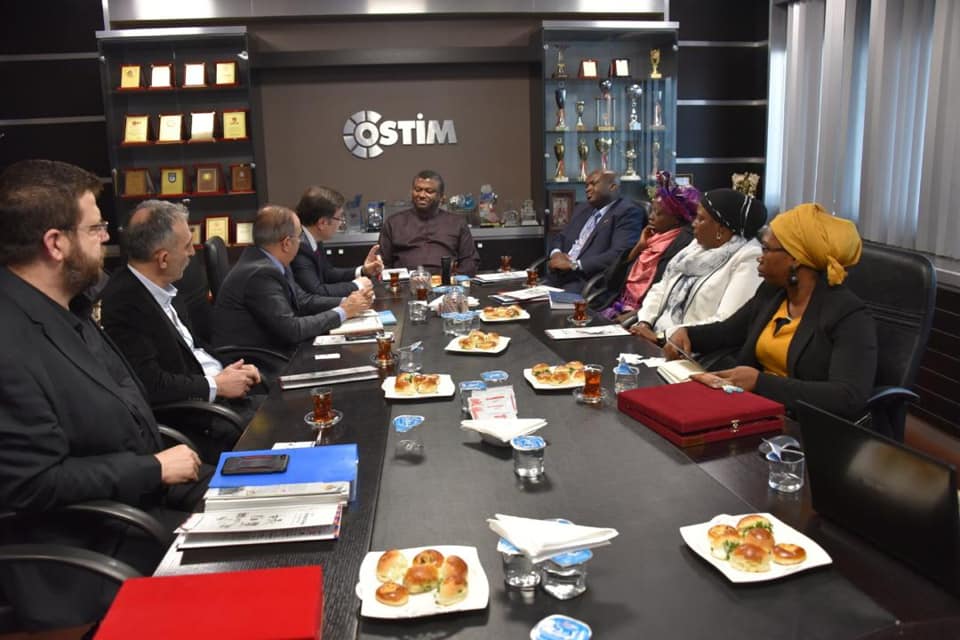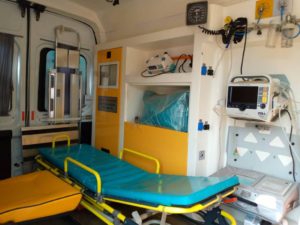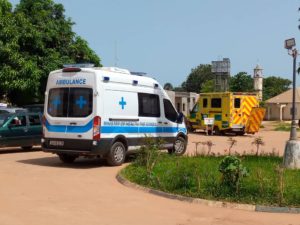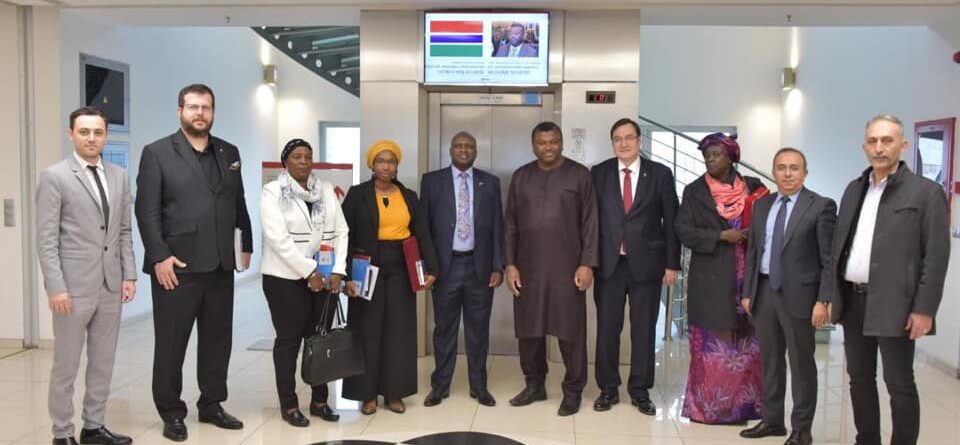Health Ministry’s $3.9m Deal: Who Got A Cut For Medical ‘Things Bought For Dying Individuals’
Health Ministry’s $3.9m deal: who got a cut for medical ‘things bought for dying individuals’
It is March 2020 – four months since the emergence of coronavirus. The virus is travelling fast, spreading around the world. The Gambia would not be spared. Covid-19 hits Banjul. Remember patient zero. Panic erupts.
With questions being asked about how the country’s extremely weak health system will cope with the weight of Covid-19, the health ministry steps up prevention and response efforts. But funds are badly needed. The health sector has historically been underfunded, not even among the top ten highest spending institutions in 2019. Help comes from a likely source. The World Bank approves a grant of US$10 million. But it is not enough. The government intervenes with virement – not without controversy though. Through this cut-and-paste approach, the government raises about D750m (approx. $14.6m) for the fight against Covid-19.
With funds available, the health ministry embarks on a spending spree. Taking $1.9m from World Bank’s $10m grant and $2m from National Assembly approved D750m from Government Local Fund (GLF), the ministry gathers $3.9m (approx. D197.3m) to spend on a shopping list of medical items and equipment from Turkey.
Malagen investigations reveal that the deal is fraught with irregularities, raising questions about corruption. Due process was barely observed in apparent breach of national and donor procurement rules. The health ministry made a contract on non-negotiable terms only to make a futile attempt to negotiate prices and specifications mid-way through. The prices of the items bought are ‘exorbitant’.
Official records seen by Malagen revealed that the ministry made reported excess expenditure of at least $1.2m (approx. D62.7m) and $565,827 (approx. D28m) from the purchase and transportation of the medical items, respectively. This totals up to D90m, more than the annual budgetary allocation of ministries of information and tourism combined. And going by the assessment of a CSO, Gambia Participates, it could build at least 10 standard health posts and 40 community boreholes in a country where access to health care and clean water continue to elude many people.
Whose decision was it to award the deal? The ministry officials point fingers at the World Bank Country Office as the ones responsible for procurement. The World Bank points fingers back at the ministry, saying the Bank does not lend funds and procure at the same time.
“The minister wants to assure you that if at all there is any evidence of bribes or commissions or incentives paid to anyone, he will act swiftly and decisively…” Dr Mustapha Bittaye, Director of health services assured.

the saga begins here
In February last year, Dr Ahmadou Lamin Samateh visited Ankara on the invitation of Emsey, a private hospital. The health minister was accompanied by his deputy permanent secretary, Mrs Fanta Bai Secka.
“We were in Turkey for various things,” Minister Samateh told Malagen at his office, adding that he met with the Turkish counterpart to discuss possibility of doubling the number of patients that Turkey provides treatment for each year from 25 to 50 people. He said he also met with the Turkish trade minister who ‘wanted to show us what they are doing in radiology’.
Malagen investigations revealed that the Minister and his delegation had also visited OSTIM Medical Industry Cluster, a conglomeration of more than 62 companies. One of the members, TMS, a company that specialises in ‘medical device design, production, import and export’ would be awarded the $3.9m contract barely two months later.
“I was told a visit was arranged for me to visit OSTIM ,” Minister Samateh confirmed when asked about his visit to the OSTIM industrial zone in Ankara. “They know we want new infrastructure. They know we want new equipment. They know we want to develop the health sector…”
Malagen investigations further revealed that one of the men who received Minister Samateh at OSTIM is Mr Mehmet Aydogan, the vice chairman of the cluster. It turns out, he is also the General Manager of TMS. He appears to be the main contact for officials at the health ministry and Gambian embassy in Turkey.
“I did not meet TMS,” the minister said when asked whether TMS officials were at the meeting with OSTIM, adding: “I didn’t know them. I didn’t remember them and even if TMS was there, I didn’t pay attention to any TMS.”
DPS Secka however seemed to remember the engagement with more clarity. “We had a short meeting with the President of OSTIM, together with the vice president (Mehmet Aydogan). The vice president of the OSTIM Group is the President of TMS,” she said.
“The Vice President later led us into a hall where we met lot of people. There were over 20 members of the OSTIM zone family. We were all seated, presentations were made,” she added.
From the minister’s visit, TMS could not miss the public relations opportunity that a visit by an African health minister offered in times of unprecedented demand for procurement of medical equipment. The company put up a picture of the minister’s visit on its website, quoting Samateh as saying: “We want our hospitals to be like your hospitals. We know that for this, we need to connect with important people like you…we are open to cooperation with you in many fields.”
How the deal was sealed
Malagen has learned from multiple sources in government that as the minister’s visit was being planned, the deputy permanent secretary Fanta Bai Secka, had asked the Gambian embassy in Turkey to make arrangements for the minister to meet Turkish companies with specialty in medical services.
Dr Muhammed Jaiteh, a Gambian medical practitioner in Turkey, told Malagen that Fanta reached out to him about names of companies that deal in medical equipment. “Basically, I was one of the people who helped link the Ministry of Health with the OSTIM Group,” he said. “Fanta contacted me by telephone. I think she got my number from the embassy.” Dr Jaiteh first met Fanta around late 2019. It was during a visit of officials from Emsey Hospital to the Gambia.
Fanta however has denied having any such conversation with Dr Jaiteh, saying the idea came from the Gambian embassy in Turkey. “It was the embassy that draw up the programme. Jaiteh did not recommend OSTIM. May be, he recommended it to the embassy,” she explained.
When contacted, Landing Kinteh, the ambassador in Turkey at the time, said: “Before the [minister’s] delegation came from The Gambia, I have never known OSTIM, I have never sat with them.”
On March 27 – less than one month after the minister’s visit to Turkey – authorities from the health ministry and Gambian embassy in Turkey – had a teleconference with the officials of the TMS group led by Mehmet Aydogan. Dr Samuel Mills, a World Bank Senior Health Specialist was also in attendance. Fanta said Ambassador Kinteh attended the meeting. Kinteh however said he was not at the said meeting. His name wasn’t recorded in the minutes of the meeting either.
According to DPS Secka, the meeting was for ‘brainstorming as to where to purchase the equipment’.
However, the minutes quoted the Minister Samateh as saying that ‘TMS will be given the task of constructing and equipping the facilities’; that the ministry intended to buy 100 ambulances.
Minister Samateh however has denied attending the meeting. He said he merely stopped to greet the participants. “If you are trying to find out if the Minister of Health instructed or mentioned to anybody to give the contract to TMS, the answer is no,” he said.
He added: “I was not even aware TMS was given the contract until later, when the contract had already been signed and some payment [40%] was made…”
However, Adama – not the real name – a staff of the ministry of foreign affairs who is familiar with the transaction, said the contract was awarded following the teleconference with TMS.
“[From the meeting], …they ordered what they wanted to order. They did not ask for any quotation from any other institutions. They just said this company [TMS].”
Malagen can confirm that on April 8 – barely two weeks after the meeting – an agreement was sealed and the contract signed. The next day – April 9 – voucher was raised for payment of 40 per cent of the $3.9m. Three months later – July 23 – the final payment was made.

Due process was barely observed
The ministry of health appears to have violated the government and donor procurement rules in awarding the $3.9m contract for the supply of medical items and equipment.
At least three government sources familiar with the transaction said the contract was singled-sourced. The ministry did not negotiate the prices nor did it prepare medical specifications before awarding the contract. It did not look elsewhere on time for better offers either.
The officials of the ministry, including Minister Samateh and DPS Fanta Bai Secka, said the decision to award the $3.9m contract to TMS was made by the World Bank Country Office, through its health specialist in the country, Dr Samuel Mills.
“The procurement is handled by the World Bank… This is a World Bank purchase,” said DPS Secka, even though for this particular procurement, $2m was contributed by the government compared to World Bank’s $1.9m.
The World Bank however has denied involvement in the decision to award the contract.
Minister Samateh also said the procurement was approved by the Gambia Public Procurement Agency.
However, the procurement authority has denied any knowledge of the transaction.
“The procurement of ambulances from Turkey in 2020 is not in our records,” Samba Tambura, the GPPA’s compliance officer told Malagen.
In an official record seen by Malagen, the Ministry claimed it did not take the procurement to GPPA for approval because it was an emergency procurement.
However, Section 44 of the GPPA Act states in clear terms that all single sourcing, even based on emergency, shall be approved by the Authority.
Also violated is a World Bank procurement guideline on direct contracting. “In all instances of direct selection, the Borrower shall ensure that the prices are reasonable and consistent with the market rates for items of a similar nature,” states a part of World Bank procurement regulations on direct contracting.
Meanwhile, the GPPA reportedly sat on the Covid-19 finance and procurement committee that approved the contract. Other oversight institutions that sat on the procurement committee were Internal Audit Department and Accountant General Department, institutions that should have played oversight functions. And a co-chair of the procurement committee that is supposedly meant to ensure value for Covid money is PS Jaiteh, a key decision maker from the Health Ministry. Minister Samateh said the Committee was to enhance accountability and transparency.
“The Idea of setting up this (procurement) Committee is to enhance transparency, accountability and to speed up the processes… Most approval processes would have gone through these departments to facilitate procurement and financial issues. So, having them in one committee, we thought, will add value and speed up the processes,” said Dr Samateh.
But did it?
The differences in prices are huge
Malagen has learned that two other companies in Turkey have made offers to supply the medical items and equipment at cheaper prices. They are ATC and AKKA.
Official records indicate that the ministry could have saved D62.7m based on prices offered by ATC and D86.1m based on prices offered by AKKA.
Minister Samateh however said ATC and AKKA could not provide specifications on time.
He explained: “At some point the ambassador Landing Kinteh contacted me. He said he got a quotation from another company that said that they could offer these items that TMS was offering at a cheaper price.
“I don’t remember the name – another gentleman walked in and also said they had quotations that were providing cheaper prices. Then, I said if these people are saying these, then it is worth looking into. So, we looked at them…But I also realized that most of the items did not have specifications and that is very important in everything.”
But would it have mattered that the two companies did not provide specification? The contract was sealed and signed weeks before the two companies were asked to provide quotations.
Adama, the foreign affairs ministry staff, said the quotations sought from the other two companies were a mere cover up. “When the ministry ordered everything from the Turkish and signed the contract, then they wanted the embassy to be involved. The ambassador refused,” she added.
Malagen goes undercover
Meanwhile, posing as interested buyers, Malagen has in July this year contacted Das Ambulans in Turkey – the manufacturers of the ambulances the ministry bought through TMS. We were to buy two Ford Transit, ICU ambulances— the same types bought by the Ministry—and equipped with a ventilator.
The company quoted a price of €58, 000 (approx. $68,975). This is $20,775 less than the price reportedly expended by the ministry on one Ford Transit ICU ambulance that is not even fitted with a ventilator.
We wanted more evidence. So, we contacted another company, Berkito Group in Turkey and they offered to sell ICU ambulances for $60,000. This price is subjected to negotiation depending on how many units we were to buy.
Malagen has also seen correspondences from Turkey’s largest ambulance company, Emergency Mobile System Company (EMS), to health ministry through foreign affair ministry. The EMS made a presentation at the Gambian embassy in Turkey on March 11 last year.
“Attached herewith are report on the said visit (visit of EMS to Gambian embassy in Turkey), the company’s brochure, copy of the PowerPoint presentation (enclosed in the flash drive) and the proforma invoice containing unit prices of the items as requested by Hon. Samateh,” stated a cover letter sent to the health ministry through foreign ministry on March 12 last year. However, the entire leadership of the health ministry told Malagen they have not seen any proposal or presentation from EMS.
Another organisation that is in the forefront of the fight against Covid-19 is the Gambia Red Cross Society. Like the ministry of health, the Red Cross has invested heavily in medical equipment, including ambulances, as part of Covid-19 response.
Few months after the arrival of ministry’s ambulances, reportedly bought at $89.750, the Red Cross bought better equipped ICU Toyota land cruiser and Toyota Hiaces ambulances at $64,426 – over US$25,000 less than the Ministry’s prices paid on ambulance.
And while the Ministry’s Ford Transit ICU ambulance are fully equipped with oxygen, it does not have a ventilator. The Red Cross’ ICU ambulances are equipped with ventilators.
Failed attempts to negotiate non-negotiable contract
The ministry of health signed the $3.9m contract with the Turkish company on non-negotiable terms. But just one month after the deal was sealed and 40 per cent payment was made, the authorities seemed to want to change their minds.
“People were even saying I was against the TMS when I halted the procurement process,” said Minister Samateh, referring to a decision he made in May to halt the procurement process. This was after the ambassador, Landing Kinteh, informed him of cheaper options.
In a correspondence seen by Malagen, the permanent secretary Muhammed Lamin Jaiteh wrote to the TMS company, asking for a reduction of the prices. “This Ministry, in its further analysis, found such evidence [of alternative, cheaper options] to be pertinent and cannot be ignored since significant price differences have been observed for most items. Without this [reduction of prices from TMS], it will be difficult to justify the single sourcing from TMS,” stated PS Jaiteh.
The prices were not the only issue. The ministry further requested that the ambulances should be diesel engine and not above ‘2 to 3 litres capacity’.
This effort was too little, too late. The fate of the deal was since sealed. The prices would not be reduced. The engine requirements would not be met. After all, the contract was agreed on non-negotiable terms.
“I am not aware of any non-negotiable contract,” Samateh however told Malagen.
The contract was signed by his permanent secretary, Mr Muhammed Jaiteh. He declined to give comments.

Ambulances – expensive to use and not suitable for this environment
The use, maintenance and repair of the ambulance versions bought by the ministry require a fortune to operate that the financially struggling sector does not seem to have
“We have been advised not to use them [the ambulances] off the road, they are not as strong,” said one of the drivers in charge of the newly purchased ambulances.
The chief vehicle controller of the Ministry, Sang Mendy, has confirmed that he had issued the directives. Mendy is the contact person between Riders for Health, the institution responsible for Gambia’s heath service vehicles, and the Ministry of Health.
Neither him nor Riders were consulted prior to the buying of the ambulances. Several government officials and independent experts told Malagen that the ambulances are not the most suitable for the conditions in the country.
Moreover, the cost involved in the use, repair and maintenance of the cars is also a cause for concern, according to many people familiar with the type and use of the vehicles. “These kinds of ambulances use an additive called AdBlue fluid with a tank capacity of 20 liters,” one of them said.
The AdBlue is a diesel exhaust fluid designed to reduce harmful emissions of nitrogen oxides from diesel vehicles to non-hazardous gases. It costs about $1,457 (approx. D70,000) for every 100,000 miles of driving. And without the additive, the ambulances shut down.
In July, the ambulances from Farafenni and Bansang were grounded because of an injector problem. The engineers at Riders had to place an order for the parts. Further, Malagen can confirm that three of the ambulances had arrived with a cooling system problem with their engines. That had to be fixed by Espace Motors.
In contrast, the spare parts of the Red Cross Toyota ambulances are available in the country, they don’t use AdBlue and the vehicles can be used off-the-road.
D28.2m excess expenditure incurred on transportation
The issue with this $3.9m deal is not just the apparent disregard for due process and lack of due diligence, resulting in reported payment of exorbitant prices for medical items and ambulances that are apparently not suitable for the environment.
The auditors have frowned upon the four months delay in the arrival of medical items that were purchased ‘in a rush’ for emergency purposes, according to multiple official sources in government.
Official records seen by Malagen indicate that the ministry reportedly paid $665,827 to transport the medical items from Turkey – $635,000 for chartered flight and $30,827 for sea transport.
When further probed on the issue, the ministry claimed they were waiting on a decision from Turkish government to bring the items by a military plane.
“We made a request to the Turkish government for them to help us transport the procured medical items to The Gambia,” said Minister Samateh. “There was no formal response from Turkish government.”
However, diplomatic sources familiar with this transaction said the Ministry had been advised from very early on by Turkey to use sea transport, which according to official records, would have cost $100,000 – i.e. $565,827 less than what the ministry reportedly paid for the transportation.
“When things got tough, they wanted the Turkish government to intervene,” said one of our diplomatic sources, adding: “The Turkish government also got angry at the time because they have their own companies, they wanted the Ministry to purchase goods from.”
When asked about high cost incurred on the transportation, Minister Samateh told Malagen that the World Bank paid for cost of transportation.
He added: “[When we did not hear from Turkey] then, the World Bank stepped up to provide the funds…even that airfreight discussion and negotiation, from the briefing that I got, Dr Samuel is the one who negotiated it.”
However, the World Bank has denied any participation.
In a reply to a Malagen email enquiry, the Bank says: “The government of the borrowing country is responsible for all procurement steps, including advertising, prequalification evaluation, preparation of bidding documents, evaluation of bids, and contract awards.
“The borrower, and not the World Bank, contracts directly with companies and consultants.”
Who gets a piece from the $3.9m deal?
Several government sources informed Malagen that the auditors believe that the contract was awarded by an individual at the health ministry with the intention to gain personal benefit from the deal.
However, no one has so far been named, according to our sources.
Isatou Jobe, the First Secretary at the Gambian embassy in Turkey, said Dr Jaiteh and some Gambians who recommended OSTIM for the purchase of medical items demanded a commission.
“Someone called me to protest that they were part of the procurement, they should have been given a commission,” she said. “When I talked to Mr Onur Ozcan (one of the leaders of TMS) – about it, he said no… If he had known that, he would add it to the price.”
Dr Jaiteh however denied that they have demanded a cut from the deal. He said: “It is comical to me that someone would just say that I was involved because I was expecting some benefits or commission.”
He explained further: “My role was to link OSTIM and the ministry. Everything thereafter was between OSTIM Group and the ministry. Whatever happened there was no transparency from our perspective. My impression is that someone is trying to coverup something using us as scapegoats.”
One Dr Ebrima Njie—a lecturer at the University of the Gambia who was studying in Turkey— told Malagen he was also involved in introducing OSTIM to Dr Jaiteh and the embassy. He also denied demanding or receiving any commission.
During our investigations, the minister and deputy permanent secretary who have been close to the transaction, flatly denied gaining any personal benefit from the deal.
“…That is very low to think of such a thing, especially when it comes to Covid and people are dying,” said Secka, in response to the suggestions that someone in authority could have received kickbacks on this procurement.
“…It is an issue of life and death… That is the lowest anyone can go, to think that someone will benefit from things that are brought for dying individuals…”
Is it really so?

